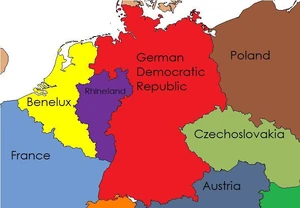The German Democratic Republic
| Deutsche Demokratische Republik
German Democratic Republic |
|---|
| Flag: |
| Anthem: Auferstanden aus Ruinen (Risen from the Ruins) |
| Location: |
| Capital: Berlin |
| Official Language: German |
| Government: Sozialistische Einheitspartei Deutschlands (Socialist Unity Party of Germany) |
| Formation: 1947 |
| Area: 348,021 km2 |
| Population: |
| Currency: German Mark (Mark der DDR) |
| Timezone: CET |
History of the German Democratic Republic
Why was the GDR created?
The German Offensive of 1944 in the Ardennes had been immeasurably successful, Allied forces had been pushed out of Eastern Belgium and Luxembourg with the Germans now once again in control of Antwerp the Western Front grinded to a halt while Soviet progress on the East was breathtaking. As Hitler celebrated the capturing of the 3rd and 1st US army at the Battle of Namur in February 1945 there were several more successes on the Western Front for the Reich, as many more liberated French cities were reoccupied there was some talk in Allied circles of signing a truce with the Nazis to fight off the Soviets yet the discovery of Auschwitz in January 1945 by Soviet forces turned any idea of a truce with the Nazi regime into an impossibility. As March approached the German High Command made a peace offer to the allies in which they would accept peace with the allies and the German cessation of Alsace-Lorraine, this was rejected. The Germans began to fortify their positions in the Western Front as more and more manpower was required to defend the Fatherland from the Soviet advance, in early April 1945 the Führer was convinced by his friends to leave Berlin with his new wife, Eva – he was not keen to “die as a dog, and be buried in the backyard, the German people will need their Führer in the coming years”. As Berlin began to feel the bite of Soviet artillery it was Goebbels who took over control of the Bunker and when the Red Army stormed the Bunker they found him in Hitler’s office. After a sentimental goodbye to Bavaria and the Eagle’s Nest Hitler was sighted in Switzerland amongst a convoy of German refugees who feared being brought under Soviet domination.
1947 - A Revolutionary Year for Germany
It was rumoured that Hitler then made his way to South America, possibly Chile or Argentina, every few years a recording of his voice would find his way to the BBC in 1949 he predicted the “rise of a new age, the Fatherland has been lost – yet her heart lives on in the faithful. The Soviet menace spreads across Europe like a plague; men like Churchill and FDR have betrayed Western civilization”. Hitler died in 1976, aged 87 in his political testament he urged that “a new Reich shall be built out of the ashes of the old, whether it be in Europe or elsewhere we must fight against the forces of Communistic Zionism which has embodied itself through the United States and her allies! The people of this world must declare ‘no more’”, after his death there was a small scale resurgence in neo-Nazi organisations across Europe and in some countries the Far Right does retain a degree of influence over moderate right-wing parties, there is a roaring trade in Hitler’s recordings through underground networks. The war had come to a close in late 1945 as the new leader of the Reich, Goebbels submitted to an unconditional surrender which was signed in Cologne, Soviet forces had by the occupied almost all of Germany. The Rhineland was a pocket of German resistance, which was then taken under American protection. At Yalta and Potsdam Stalin had demanded that all of Germany be brought under Soviet influence, something that both Churchill and De Gaulle protested against furiously. However FDR upheld his demands and managed to please the British and French by promising that the American held parts of Germany would never pass into Soviet hands in hope that the post-war world could be one of international co-operation. In 1947 the German Democratic Republic was declared in the Soviet-held zone, 1951 saw the withdrawal of American forces from the occupied zone which was the Saarland and Trier, a referendum was held in these regions between unity with the rest of Germany or membership in the new country that was forming in the Benelux region, in the words of Churchill “we could risk no more than a meek condemnation, the world is tired of war – our battles must be fought when we are strong enough to win them”.

